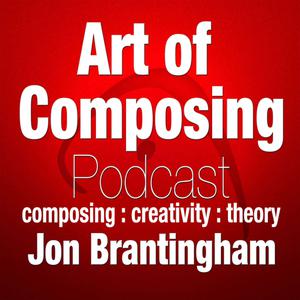The Pathway to Mastery, Part 2 – The Ideal Composer Apprenticeship
Episode 5 of the Art of Composing Podcast. In this episode, I cover the next stage of your pathway to mastery, the apprenticeship. Find out about why an apprenticeship is so important, the different phases of an apprenticeship, and how to take the most advantage of your composer apprenticeship.
What is in this episode:
What is an apprenticeship, and how long will it take?
The three phases of an apprenticeship.
The 8 Strategies for getting the most out of your apprenticeship.
Resources and Links Mentioned in this Episode:
Mastery by Robert Greene
Episode 5 Take Aways
The goal of an apprenticeship is not money, a good position, a title, or a diploma, but rather the transformation of your mind and character.
There are three phases or three modes to the ideal apprenticeship.
They are Deep observation or the passive mode, where you observe and absorb as much as possible about the world you are trying to master.
Skills acquisition or the practice mode, where you break down all of the necessary skills in your field and practice them until they become tacit knowledge.
And Experimentation or the active mode, in which you take that knowledge and you create your own work so that it can be judged by the public and yourself. You are trying to fill the gaps in your own knowledge so you can become better than you are now.
The 8 Strategies For the Ideal Apprenticeship are:
Value learning over money.
Keep Expanding Your Horizons
Revert to a Feeling on Inferiority
Trust the process
Move towards resistance and pain
Apprentice yourself in failure
Combine the "How" and the "What"
Advance Through Trial and Error
Transcript
Welcome back to the Art of Composing Podcast. I am excited to have you listening today.
Today's episode is going to be about Mastery. What it is, how we can attain it, and why we would want to attain it. But I am not going to just talk about Mastery as an obscure theory. Instead, I thought this would be a good opportunity to a little bit talk about my history, how I started composing, how I got to where I am, and how I see my journey unfolding. I don't consider myself a master of music composition, but I am working towards it. And I hope part of the reason my website, artofcomposing.com resonates with people is because I am approaching the subject of teaching music composition from the standpoint of having to teach myself.
So without further ado, let's get on with the featured content.
Featured Content
Mastery is a subject not often touched on or talked about in modern society. If you think about it, most things in life are really designed to prevent you from mastering a subject.
The biggest culprit for this, I believe, is not TV, although TV doesn't help. No I believe its school. School is designed, from the beginning, to be a place of conformity and regurgitation. You are forced through your most creative, and curious part of your life to listen to teachers talk about subjects you just don't care about. And then after the day is done, you have to go home and study those same subjects, and do your homework.
This all leads to a lack of motivation on the part of children to care much about school.
For me personally, this lead to a habit of procrastinating. You see, procrastination really has nothing to do with you being lazy. I was and I still am, a hard worker. The thing is, I just never wanted to work on what I had to work on. Homework, diaramas, reports, papers, whatever.
Let me say first though, that this has nothing to do with the teachers themselves. I had some great teachers growing up, and I have friends now that are teachers, and many of them care deeply about the kids they teach. But they are in a system that is designed to create factory workers, not mastery.
So why am I talking about this.
Well, I want to make it clear that mastery is attainable for anyone. That is right.
16 February 2014, 5:51 pm
